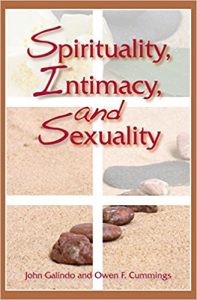Spirituality, Intimacy, and Sexuality
by Dr. John Galindo and Owen Cummings
 Spirituality, Intimacy, and Sexuality seemed like a good choice for review during February, the month of lovers (for March publication). But the book is not about romantic love. Spirituality, intimacy, and sexuality are every person’s concern, not just couples. A glance at the table of contents proves that this is the authors’ intent. The first three chapters after the Introduction are about spirituality and sexuality in marriage, the celibate vocation, and single life, respectively.
Spirituality, Intimacy, and Sexuality seemed like a good choice for review during February, the month of lovers (for March publication). But the book is not about romantic love. Spirituality, intimacy, and sexuality are every person’s concern, not just couples. A glance at the table of contents proves that this is the authors’ intent. The first three chapters after the Introduction are about spirituality and sexuality in marriage, the celibate vocation, and single life, respectively.
A key point in the chapter on marriage is that it is a “crucible” for intimacy. Crucible is a good word here, referring to the difficulty of giving oneself fully to a spouse and to God. Complete self-giving makes a person vulnerable. But giving “nearly all” is not adequate for a thriving relationship with one’s beloved or with God. There are other pearls of wisdom here about pleasing one’s spouse, emotional and physical intimacy, and “dating for life” involving playfulness.
“Intimacy, or deep friendship, is knowing another and allowing oneself to be known” (23). That applies to marriage, the celibate vocation, and the single life. The quotation actually comes from the chapter on celibacy. It is followed by discussions about making a commitment to intimacy in order to be a healthy person and about the challenges to faithfulness.
The chapter on singles takes the discussion further, into the attitude of contentment. The authors talk about three groups of singles in regard to how they view their state in life. Galindo and Cummings posit that committed and contented single persons live without any expectation that mutual attraction might turn into marriage. “They encounter and express God’s love in their relationships with close family and friends” (29). The second group is comprised of singles who are not content about their status and believe they can never be happy without being married. The trouble with this position is its demand, “God, give me what I want, not what you think I need.” It tells God, “You are not sufficient and I can only be satisfied with a spouse.” If contentment is based on getting what we want, we will be unhappy a lot of the time. The third group of singles are content and open to marriage, and may even desire it. They believe contentment is based on getting what they need, which God knows even if they do not. They live life fully whether or not God blesses them with spouses.
What most caught my attention in the chapter devoted to commitment is the authors’ assertion that we must commit to God with a “resolve to contend with him, to engage him always” (43). While I have long had some sense of the significance of wrestling with God, I’ve never thought of it as a manifestation of devotion, as the authors call it. Yet struggling with God is devotion, when we “take hold of God in urgent times” instead of pulling away while feeling abandoned. When I cry out to God, “You’d better hold on to me because I’m barely hanging on by my fingernails,” I express more than trust that God is committed to me. Faithfulness underlies even a negative emotional response because it maintains a connection.
This book is small and easy to read, but it offers much. There is discussion of transparency, boundaries, accountability, and forgiveness. If a reader nearing the end isn’t yet convinced that sexuality and spirituality are closely related, Chapter 8 addresses that question straight on. The authors’ concluding reflections describe the basic vocation as “the commitment to becoming a whole, healthy human being. All other vocations are made possible by the first.” They continue with a succinct statement of their basic premise: “Intimate friendship is the foundation for authentic spirituality and sexuality” (84).
Each author brings a different professional perspective to the book. Dr. John Galindo is a psychologist with a private practice. He provides counseling services at Mount Angel Seminary where Owen Cummings, a Roman Catholic deacon, is a professor of theology. The text always uses the first person voice to relate a personal story or an insight, yet there is rarely an indication of which writer is speaking. Sometimes the reader can assume that an anecdote about a counseling experience comes from Galindo but one can only guess for most of the other stories. This isn’t really a problem as the book’s voice sounds consistent.
Readers can hear in this book God’s tender love, warmth, and desire to be intimate with us. Biblical characters come alive through the authors’ retelling of ancient stories. Galindo and Cummings continually and compassionately apply Christian Scriptures to human experience. The discussion questions at each chapter’s end can promote good conversations with God. Spirituality, Intimacy, and Sexuality could be good reading, even spiritual reading, for any month.
About the reviewer
Mary Ann Paulukonis is still learning about intimacy after forty-five years of marriage.
Disclaimer: Book reviews do not imply and are not to be used as official endorsement by the USCCB of the work or those associated with the work. Book reviews are solely intended as a resource regarding publications that might be of interest to For Your Marriage visitors.




